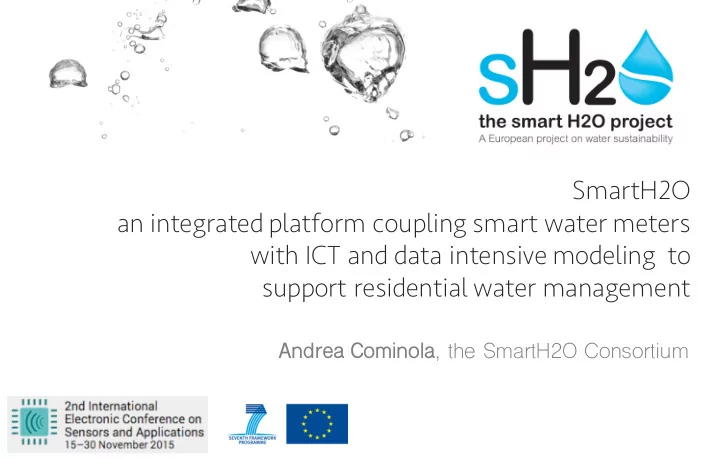

SmartH2O an integrated platform coupling smart water meters with ICT and data intensive modeling to support residential water management Andrea Cominola , the SmartH2O Consortium
URBAN WATER MANAGEMENT URBAN CONTEXT 41 megacities urban worldwide 66% population growth 54% 2014 2030 2050 Source: United Nations. Department of Economic and Social Affairs. Population Division, 2010 2
URBAN WATER MANAGEMENT URBAN CONTEXT 3
URBAN WATER DEMAND MANAGEMENT URBAN CONTEXT DEMAND MANAGEMENT 4
URBAN WATER DEMAND MANAGEMENT user level city scale strategic level customized management planning tailored WDMS 5
THE PROJECT_GOAL MAIN GOAL Understanding, modelling and modifying consumers behavior to achieve quantifiable water savings in the residential sector 6
THE PROJECT_CONCEPT KEY ELEMENTS High-resolution water consumption data • Interaction with customers for information sharing and socio- • psychographic data gathering Gamification techniques for users engagement • LEVERAGES FOR WATER DEMAND MANAGEMENT Customized feedbacks to water consumers – RECOMMENDATIONS • Rewards (and dynamic pricing) – BEHAVIOURAL ECONOMICS • 7
THE PROJECT_USE CASES 8
THE PROJECT_PLATFORM behavioral modeling administrator dashboard water water consumption consumption level forecast at drivers the customer identification gamified bill scale online and board game smart meters and end use analysis tailored feedbacks Response to prescriptive norms WDMS gamified bill price schemes 9
platform Technological insights
DATA GATHERING SM SMART MET ETER ERS 1-hour sampling resolution data 400 new smart meters installed in the Swiss case 1 1
DATA GATHERING ONLINE SURVEYS YS - online surveys are rolled out with the SmartH2O users, in order to collect us users’ psych cho-so sociographic da data (e.g., house characteristics, water consumption devices) and at attitudes (water saving and consumption attitudes and water price preferences) - surveys are also developed to get feedbacks from the users on the usability of the SmartH2O platform 12
END_USE CHARACTERIZATION A new algorithm to perform household energy and water consumption TR TRACE DISAGGREGATI TION into end-uses (e.g., washing machine, toilet, tap, etc…) has been developed, with the purpose of profiling users’ consumption. HSID ¡algorithm Preliminary experiment: 1 household (New Zealand) Piecewise constant trajectories on 1 min resolution built from 10s resolution sampling 13
USER BEHAVIOURAL MODELING Single user’s BEHAVIORAL MODELING through CLUSTERING and CLASSIFICATION techniques. 11 % High consumers 11% Low consumers 37 % 37% 24 3 22 2.5 20 18 52% 52 % 2 Medium consumers 16 Hour of day 14 Normalized household consumption 0.15 1.5 12 10 0.1 1 8 6 0.05 0.5 4 2 0 0 0 20 40 60 80 100 120 140 160 180 200 0 5 10 15 20 25 Average daily consumption [Liters] Hour the day 14
USER BEHAVIOURAL MODELING A first prototype of AGENT-BASED MODEL for multi-user modelling 15
CUSTOMERS WEB PORTAL 16
CUSTOMERS ENGAGEMENT and GAMIFICATION 17
next steps
SMART SENSORS 1 9
MODELLING SMART SENSORS 2 0
MODELLING USERS’ ENGAGEMENT SMART SENSORS 2 1
MODELLING USERS’ ENGAGEMENT Closing the loop with the design and implementation of customized water demand management strategies SMART Water savings monitoring SENSORS 2 2
The consortium
http://www.smarth2o-fp7.eu/ @smartH2Oproject #SmartH2O @AndreaCominola @NRMPolimi Andrea Cominola, PhD candidate andrea.cominola@polimi.it thank you Politecnico di Milano Department of Electronics, Information and Bioengineering
Recommend
More recommend